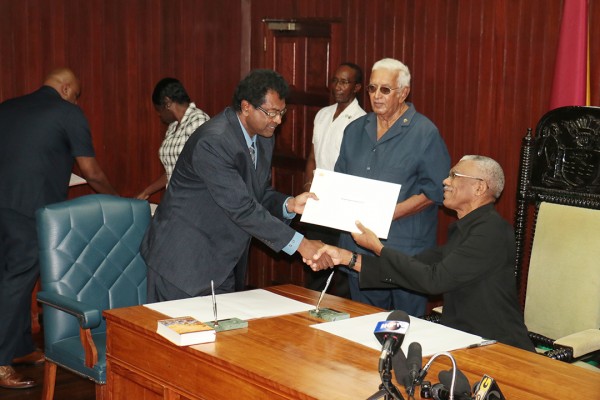Reform of the Guyana Police Force is high on the agenda of the newly-appointed APNU+AFC Minister of National Security Khemraj Ramjattan, who yesterday zeroed in on the modernisation and professionalising of the agency as his priorities.
Speaking to reporters shortly after taking the oath of office at the Ministry of the Presidency, Ramjattan, an attorney and leader of the Alliance for Change (AFC), said that he has some plans mainly for the Guyana Police Force that will be executed shortly. The Home Affairs Ministry has now been restyled as the Ministry of National Security.

The Minister of Home Affairs in the past was responsible for the Guyana Police Force, the Guyana Prison Service, the Guyana Fire Service, the General Register Office and the Police Complaints Authority. It is unclear if all the agencies will be under the command of Ramjattan, who had for many years been mentioned as a likely Minister of Home Affairs candidate when he was in the ranks of the PPP.
Asked what his plans are, he mentioned that the Guyana Prison Service and Guyana Fire Service need strengthening but said that the professionalising and modernising of the police force, particularly with regards to having better recruits and improving the recruitment process, is at the top of his list.
“I think we can get it done with the plans that we have in our manifesto and the fact that speaking to the international donor countries, we are going to get a tremendous amount of support and you rest assure that those (crime) rates, with those plans, are going to go down. I promise you that,” he said.
The APNU+AFC government in its elections manifesto had promised to develop a comprehensive public security plan that would identify the main causes of violent crimes in Guyana and the mechanisms for their prevention. Over the years, the force has faced heavy criticism from the opposition and the general public for its failure to tackle the crime situation and solve high profile crimes.
A crime wave sparked by the flight of five dangerous prisoners from the Camp Street jail in February, 2002 severely undermined law and order for following five years and led to yet unresolved allegations that the PPP/C government turned a blind eye to the activities of death squads led by now imprisoned drug trafficker Roger Khan and others. This issue has been high on the agenda of both the AFC and APNU.
Meanwhile, Minister of the newly-created Ministry of Citizenry Winston Felix said that he will be responsible for immigration issues. Felix said further that while his ministry is now on a “stand alone” basis, it was there before as part of the Ministry of Home Affairs. He said that he would now want to examine the existing policies in relation to citizenship and immigration issues. “I would want to present these with recommendations in line with APNU where there are changes considered,” he pointed out.
The former Commissioner of Police said now that he has taken the oath of office policies will have to be developed. He could not say where his office will be located but opined that that will be sorted out in the coming days.
Meanwhile, newly-appointed Minister of Indigenous Peoples’ Affairs Sydney Allicock told Stabroek News following yesterday’s ceremony that he will be looking to ensure that elections for toshaos (village captains) take place so that the leaders of the various Amerindian villages can be chosen. These polls were to be held in April this year but were postponed to next month because of the May 11th general elections.
“Getting the ministry in order and of course this is about the indigenous people in the interior, so we have the elections for all first to get the toshaos in place so that we can be able to come together to make the plans for land demarcation, settling land issues, to look at the economic programmes within communities. You cannot do that without their consent or planning,” he said in response to a question on what are his immediate plans.
He stressed that without leaders of the communities in place, there will be “no plans or anything else to do”. He said that the Toshao elections are important as without these there is very little that could be done for the indigenous people.
Noel Holder, the new Minister of Agriculture said that he first has to familiarise himself with what is going on in the sector and from this he will be able to assess what should be his first priority.
Asked about the ailing sugar industry, he made it clear that there is no question of closing it down. Holder, the widower of AFC founding member Sheila Holder, said that ways have to be found to get it out of the situation that it is currently in. He pointed out that the industry is becoming a burden on the national budget and that shouldn’t be. He said that sugar is valuable to the economy. “Sugar is very important to the economy, there is no question about that,” he said. With sugar in dire straits and challenges in the rice sector and drainage, Holder’s portfolio is seen as a very challenging one.




